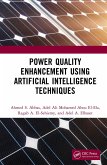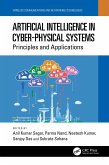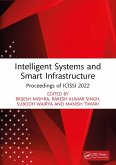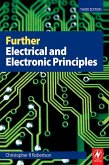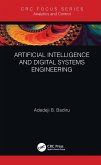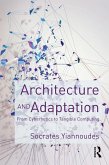Ahmed S. Abbas, Adel Ali Mohamed Abou El-Ela, Ragab A. El-Sehiemy, Adel A. Elbaset
Power Quality Enhancement using Artificial Intelligence Techniques (eBook, PDF)
52,95 €
52,95 €
inkl. MwSt.
Sofort per Download lieferbar

26 °P sammeln
52,95 €
Als Download kaufen

52,95 €
inkl. MwSt.
Sofort per Download lieferbar

26 °P sammeln
Jetzt verschenken
Alle Infos zum eBook verschenken
52,95 €
inkl. MwSt.
Sofort per Download lieferbar
Alle Infos zum eBook verschenken

26 °P sammeln
Ahmed S. Abbas, Adel Ali Mohamed Abou El-Ela, Ragab A. El-Sehiemy, Adel A. Elbaset
Power Quality Enhancement using Artificial Intelligence Techniques (eBook, PDF)
- Format: PDF
- Merkliste
- Auf die Merkliste
- Bewerten Bewerten
- Teilen
- Produkt teilen
- Produkterinnerung
- Produkterinnerung

Bitte loggen Sie sich zunächst in Ihr Kundenkonto ein oder registrieren Sie sich bei
bücher.de, um das eBook-Abo tolino select nutzen zu können.
Hier können Sie sich einloggen
Hier können Sie sich einloggen
Sie sind bereits eingeloggt. Klicken Sie auf 2. tolino select Abo, um fortzufahren.

Bitte loggen Sie sich zunächst in Ihr Kundenkonto ein oder registrieren Sie sich bei bücher.de, um das eBook-Abo tolino select nutzen zu können.
The text discusses the use of optimization algorithms in determining the optimal planning of both distributed generation units and capacitor banks in distribution systems. It also showcases the measure in selecting the optimal parameters of the single tuned filter to mitigate a specific harmonic passband based on a parametric analysis.
- Geräte: PC
- ohne Kopierschutz
- eBook Hilfe
- Größe: 7.46MB
Andere Kunden interessierten sich auch für
![Power Quality Enhancement using Artificial Intelligence Techniques (eBook, ePUB) Power Quality Enhancement using Artificial Intelligence Techniques (eBook, ePUB)]() Ahmed S. AbbasPower Quality Enhancement using Artificial Intelligence Techniques (eBook, ePUB)52,95 €
Ahmed S. AbbasPower Quality Enhancement using Artificial Intelligence Techniques (eBook, ePUB)52,95 €![Convergence of Deep Learning and Artificial Intelligence in Internet of Things (eBook, PDF) Convergence of Deep Learning and Artificial Intelligence in Internet of Things (eBook, PDF)]() Convergence of Deep Learning and Artificial Intelligence in Internet of Things (eBook, PDF)52,95 €
Convergence of Deep Learning and Artificial Intelligence in Internet of Things (eBook, PDF)52,95 €![Artificial Intelligence in Cyber-Physical Systems (eBook, PDF) Artificial Intelligence in Cyber-Physical Systems (eBook, PDF)]() Artificial Intelligence in Cyber-Physical Systems (eBook, PDF)52,95 €
Artificial Intelligence in Cyber-Physical Systems (eBook, PDF)52,95 €![Intelligent Systems and Smart Infrastructure (eBook, PDF) Intelligent Systems and Smart Infrastructure (eBook, PDF)]() Intelligent Systems and Smart Infrastructure (eBook, PDF)40,95 €
Intelligent Systems and Smart Infrastructure (eBook, PDF)40,95 €![Further Electrical and Electronic Principles (eBook, PDF) Further Electrical and Electronic Principles (eBook, PDF)]() C R RobertsonFurther Electrical and Electronic Principles (eBook, PDF)50,95 €
C R RobertsonFurther Electrical and Electronic Principles (eBook, PDF)50,95 €![Artificial Intelligence and Digital Systems Engineering (eBook, PDF) Artificial Intelligence and Digital Systems Engineering (eBook, PDF)]() Adedeji B. BadiruArtificial Intelligence and Digital Systems Engineering (eBook, PDF)21,95 €
Adedeji B. BadiruArtificial Intelligence and Digital Systems Engineering (eBook, PDF)21,95 €![Architecture and Adaptation (eBook, PDF) Architecture and Adaptation (eBook, PDF)]() Socrates YiannoudesArchitecture and Adaptation (eBook, PDF)56,95 €
Socrates YiannoudesArchitecture and Adaptation (eBook, PDF)56,95 €-
-
-
The text discusses the use of optimization algorithms in determining the optimal planning of both distributed generation units and capacitor banks in distribution systems. It also showcases the measure in selecting the optimal parameters of the single tuned filter to mitigate a specific harmonic passband based on a parametric analysis.
Dieser Download kann aus rechtlichen Gründen nur mit Rechnungsadresse in A, B, BG, CY, CZ, D, DK, EW, E, FIN, F, GR, HR, H, IRL, I, LT, L, LR, M, NL, PL, P, R, S, SLO, SK ausgeliefert werden.
Produktdetails
- Produktdetails
- Verlag: Taylor & Francis eBooks
- Seitenzahl: 126
- Erscheinungstermin: 14. März 2023
- Englisch
- ISBN-13: 9781000844979
- Artikelnr.: 67317528
- Verlag: Taylor & Francis eBooks
- Seitenzahl: 126
- Erscheinungstermin: 14. März 2023
- Englisch
- ISBN-13: 9781000844979
- Artikelnr.: 67317528
- Herstellerkennzeichnung Die Herstellerinformationen sind derzeit nicht verfügbar.
Prof. Dr. Adel Ali Mohamed Abou El-Ela was born in 1954, Tanta City, Egypt. He received his B.Sc., M.Sc. and Ph.D degrees in Electrical Engineering from Menoufia University, Egypt in 1977, 1980 and 1983, respectively. In 2006 until 2007 he was the Head of Electrical Engineering Department and general supervisor of Strategic Studies and Leader Development Center at Menoufia University, Egypt. In 2007 until 2008 he was the Vice-Dean of Faculty of Engineering at Menoufia University, Egypt. In 2008 until 2011 he was the Dean of Faculty of Engineering at Menoufia University, Egypt. Now, he was the Dean of Alexandria High Institute for Engineering and Technology, Alexandria, Egypt. Prof. Abou El-Ela published over 150 technical papers in International Journals and Conferences. He supervised and examined more than 110 of M.Sc and Ph.D. thesis at Menoufia and other Egyptian Universities.
Eng. Ahmed S. Abbas was born in Menoufia, Egypt, in 1991. currently works at the Department of Electrical Engineering , Mechanical and Electrical Research Institute, NWRC, Egypt. Main research topics are in electrical power systems engineering, Renewable Energies, Optimization techniques applications. Now, I'm a PhD student researcher at Shebin El kom faculty of engineering- Menoufiya University. I received my M.Sc. at Shebin El kom faculty of engineering- Menoufiya University in 2018. I have 4 articles in peer review journals and conferences.
Prof. Dr. Ragab A. El-Sehiemy was born in Menoufia, Egypt, in 1973. He received the B.Sc., Msc and Ph.D. degrees from Menoufia University, Egypt, in 1996, 2005, and 2008, respectively. He is currently Professor with the Electrical Engineering Department, Faculty of Engineering, Kafrelsheikh University, Egypt. He received Prof. Mahmoud Khalifia Award in Power System Engineering from Academy of research and technology in 2016. He is the receipt of El-Shorouk Academy for Computers& Information Technology in Industry from Academy of research and technology in 2021. Prof. El-Sehiemy is one of the top 2% of the effective scientists I n 2020 according Elsevier data base. He is an Editor of International Journal of Engineering Research in Africa and an Associate Editor in IEEE Access. Professor El-Sehiemy has more than 150 articles in peer review journals and conferences. His research interests include smart grid and its applications, optimization and AI, and its application to power systems and Renewable energies.
Adel A Elbaset, Ph.D., is a Full Professor with the Faculty of Engineering at Minia University, Egypt. He received the B.S., M.Sc., and Ph.D. from Minia University in 1995, 2000, and 2006, respectively. Dr. Elbaset is also currently a Full Professor with the Faculty of Engineering at Heliopolis University where he also works as a Vice-Dean for Student Affairs and Head of the Department of Electromechanics. He has published over 120 technical papers in international journals and conferences proceedings and has supervised and examined more than 50 M.Sc. and Ph.D. theses at Minia and other Egyptian universities. His research interests are in the area of wind energy systems, photovoltaics, renewable energy systems, power electronics, power system protection and control, power quality and harmonics, and applications of neural networks and fuzzy systems. Dr. Elbaset has published 13 international books in the field of renewable energy.
Eng. Ahmed S. Abbas was born in Menoufia, Egypt, in 1991. currently works at the Department of Electrical Engineering , Mechanical and Electrical Research Institute, NWRC, Egypt. Main research topics are in electrical power systems engineering, Renewable Energies, Optimization techniques applications. Now, I'm a PhD student researcher at Shebin El kom faculty of engineering- Menoufiya University. I received my M.Sc. at Shebin El kom faculty of engineering- Menoufiya University in 2018. I have 4 articles in peer review journals and conferences.
Prof. Dr. Ragab A. El-Sehiemy was born in Menoufia, Egypt, in 1973. He received the B.Sc., Msc and Ph.D. degrees from Menoufia University, Egypt, in 1996, 2005, and 2008, respectively. He is currently Professor with the Electrical Engineering Department, Faculty of Engineering, Kafrelsheikh University, Egypt. He received Prof. Mahmoud Khalifia Award in Power System Engineering from Academy of research and technology in 2016. He is the receipt of El-Shorouk Academy for Computers& Information Technology in Industry from Academy of research and technology in 2021. Prof. El-Sehiemy is one of the top 2% of the effective scientists I n 2020 according Elsevier data base. He is an Editor of International Journal of Engineering Research in Africa and an Associate Editor in IEEE Access. Professor El-Sehiemy has more than 150 articles in peer review journals and conferences. His research interests include smart grid and its applications, optimization and AI, and its application to power systems and Renewable energies.
Adel A Elbaset, Ph.D., is a Full Professor with the Faculty of Engineering at Minia University, Egypt. He received the B.S., M.Sc., and Ph.D. from Minia University in 1995, 2000, and 2006, respectively. Dr. Elbaset is also currently a Full Professor with the Faculty of Engineering at Heliopolis University where he also works as a Vice-Dean for Student Affairs and Head of the Department of Electromechanics. He has published over 120 technical papers in international journals and conferences proceedings and has supervised and examined more than 50 M.Sc. and Ph.D. theses at Minia and other Egyptian universities. His research interests are in the area of wind energy systems, photovoltaics, renewable energy systems, power electronics, power system protection and control, power quality and harmonics, and applications of neural networks and fuzzy systems. Dr. Elbaset has published 13 international books in the field of renewable energy.
Chapter 1. Introduction. 1.1. General. 1.2. Book Objectives. 1.3. Book
Contributions. 1.4. Book outlines. Chapter 2. Power Quality in Smart
Distribution System. 2.1. Preface. 2.2. Introduction. 2.3. Smart
Distribution Systems. 2.4. Distributed Generation units (DGs). 2.5. Power
Quality in Distribution Systems. Chapter 3. Optimization Techniques. 3.1.
Preface. 3.2. Introduction. 3.3. Optimization Techniques Classification.
3.4. Mathematical Formulation of WCA. 3.5. Conclusion. Chapter 4. Harmonic
Load Flow Analysis for Radial Distribution Systems. 4.1. Preface. 4.2.
Introduction. 4.3. Fundamental Load Flow. 4.4. Harmonic Load Flow. 4.5.
Single Tuned Filter Representation In Load Flow. 4.6. Conclusion . Chapter
5. Optimal Placement and Sizing of Distributed Generation and Capacitor
Banks in Distribution Systems. 5.1. Preface. 5.2. Introduction. 5.3.
Problem Formulation. 5.4. Applications. 5.5. Results and comments. 5.6.
Conclusion. Chapter 6. Parametric Analysis of Single Tuned Harmonic Filter.
6.1. Preface. 6.2. Introduction. 6.3. Single tuned filter (STF) design.
6.4. Impact of filter parameters on its characteristics curve. 6.5. Single
Tuned Filter Passband. 6.6. Impact of the system characteristics on the STF
performance. 6.7. Conclusion. Chapter 7. Harmonic Mitigation for
Distribution Systems With Inverter-Based DGs. 7.1. Preface. 7.2.
Introduction. 7.3. Problem Formulation. 7.4. Proposed STF Planning
procedure. 7.5. Applications. 7.6. Simulation Results and Discussions. 7.7.
Conclusion. Chapter 8. Conclusions and Future Works. 8.1. Conclusions.
References.
Contributions. 1.4. Book outlines. Chapter 2. Power Quality in Smart
Distribution System. 2.1. Preface. 2.2. Introduction. 2.3. Smart
Distribution Systems. 2.4. Distributed Generation units (DGs). 2.5. Power
Quality in Distribution Systems. Chapter 3. Optimization Techniques. 3.1.
Preface. 3.2. Introduction. 3.3. Optimization Techniques Classification.
3.4. Mathematical Formulation of WCA. 3.5. Conclusion. Chapter 4. Harmonic
Load Flow Analysis for Radial Distribution Systems. 4.1. Preface. 4.2.
Introduction. 4.3. Fundamental Load Flow. 4.4. Harmonic Load Flow. 4.5.
Single Tuned Filter Representation In Load Flow. 4.6. Conclusion . Chapter
5. Optimal Placement and Sizing of Distributed Generation and Capacitor
Banks in Distribution Systems. 5.1. Preface. 5.2. Introduction. 5.3.
Problem Formulation. 5.4. Applications. 5.5. Results and comments. 5.6.
Conclusion. Chapter 6. Parametric Analysis of Single Tuned Harmonic Filter.
6.1. Preface. 6.2. Introduction. 6.3. Single tuned filter (STF) design.
6.4. Impact of filter parameters on its characteristics curve. 6.5. Single
Tuned Filter Passband. 6.6. Impact of the system characteristics on the STF
performance. 6.7. Conclusion. Chapter 7. Harmonic Mitigation for
Distribution Systems With Inverter-Based DGs. 7.1. Preface. 7.2.
Introduction. 7.3. Problem Formulation. 7.4. Proposed STF Planning
procedure. 7.5. Applications. 7.6. Simulation Results and Discussions. 7.7.
Conclusion. Chapter 8. Conclusions and Future Works. 8.1. Conclusions.
References.
Chapter 1. Introduction. 1.1. General. 1.2. Book Objectives. 1.3. Book
Contributions. 1.4. Book outlines. Chapter 2. Power Quality in Smart
Distribution System. 2.1. Preface. 2.2. Introduction. 2.3. Smart
Distribution Systems. 2.4. Distributed Generation units (DGs). 2.5. Power
Quality in Distribution Systems. Chapter 3. Optimization Techniques. 3.1.
Preface. 3.2. Introduction. 3.3. Optimization Techniques Classification.
3.4. Mathematical Formulation of WCA. 3.5. Conclusion. Chapter 4. Harmonic
Load Flow Analysis for Radial Distribution Systems. 4.1. Preface. 4.2.
Introduction. 4.3. Fundamental Load Flow. 4.4. Harmonic Load Flow. 4.5.
Single Tuned Filter Representation In Load Flow. 4.6. Conclusion . Chapter
5. Optimal Placement and Sizing of Distributed Generation and Capacitor
Banks in Distribution Systems. 5.1. Preface. 5.2. Introduction. 5.3.
Problem Formulation. 5.4. Applications. 5.5. Results and comments. 5.6.
Conclusion. Chapter 6. Parametric Analysis of Single Tuned Harmonic Filter.
6.1. Preface. 6.2. Introduction. 6.3. Single tuned filter (STF) design.
6.4. Impact of filter parameters on its characteristics curve. 6.5. Single
Tuned Filter Passband. 6.6. Impact of the system characteristics on the STF
performance. 6.7. Conclusion. Chapter 7. Harmonic Mitigation for
Distribution Systems With Inverter-Based DGs. 7.1. Preface. 7.2.
Introduction. 7.3. Problem Formulation. 7.4. Proposed STF Planning
procedure. 7.5. Applications. 7.6. Simulation Results and Discussions. 7.7.
Conclusion. Chapter 8. Conclusions and Future Works. 8.1. Conclusions.
References.
Contributions. 1.4. Book outlines. Chapter 2. Power Quality in Smart
Distribution System. 2.1. Preface. 2.2. Introduction. 2.3. Smart
Distribution Systems. 2.4. Distributed Generation units (DGs). 2.5. Power
Quality in Distribution Systems. Chapter 3. Optimization Techniques. 3.1.
Preface. 3.2. Introduction. 3.3. Optimization Techniques Classification.
3.4. Mathematical Formulation of WCA. 3.5. Conclusion. Chapter 4. Harmonic
Load Flow Analysis for Radial Distribution Systems. 4.1. Preface. 4.2.
Introduction. 4.3. Fundamental Load Flow. 4.4. Harmonic Load Flow. 4.5.
Single Tuned Filter Representation In Load Flow. 4.6. Conclusion . Chapter
5. Optimal Placement and Sizing of Distributed Generation and Capacitor
Banks in Distribution Systems. 5.1. Preface. 5.2. Introduction. 5.3.
Problem Formulation. 5.4. Applications. 5.5. Results and comments. 5.6.
Conclusion. Chapter 6. Parametric Analysis of Single Tuned Harmonic Filter.
6.1. Preface. 6.2. Introduction. 6.3. Single tuned filter (STF) design.
6.4. Impact of filter parameters on its characteristics curve. 6.5. Single
Tuned Filter Passband. 6.6. Impact of the system characteristics on the STF
performance. 6.7. Conclusion. Chapter 7. Harmonic Mitigation for
Distribution Systems With Inverter-Based DGs. 7.1. Preface. 7.2.
Introduction. 7.3. Problem Formulation. 7.4. Proposed STF Planning
procedure. 7.5. Applications. 7.6. Simulation Results and Discussions. 7.7.
Conclusion. Chapter 8. Conclusions and Future Works. 8.1. Conclusions.
References.

